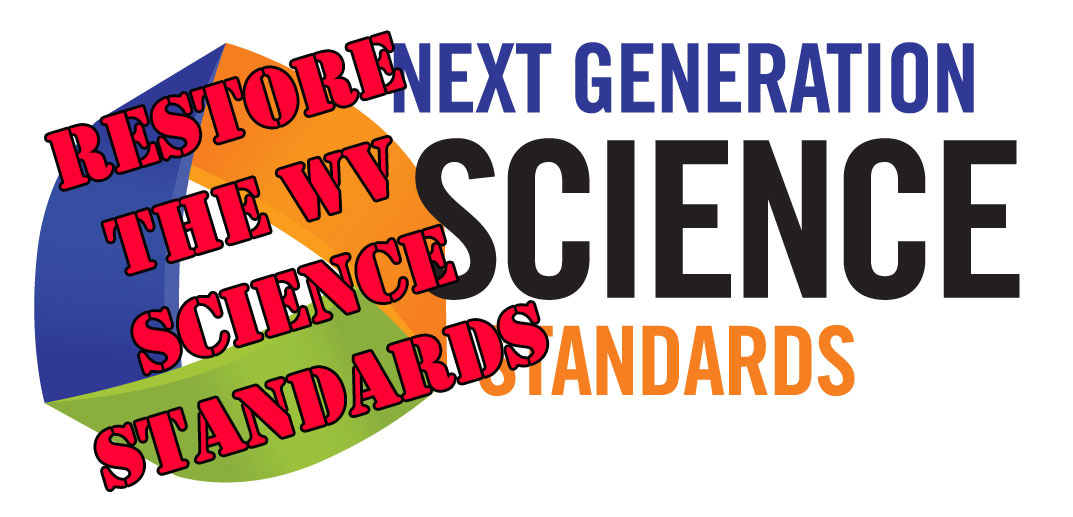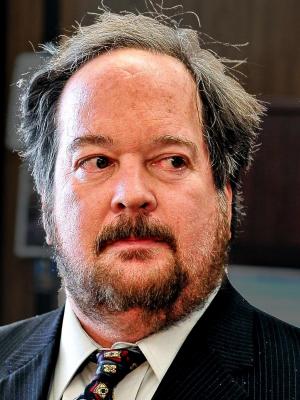For the last few weeks, we’ve been tracking West Virginia’s flirtation with climate change denial in science standards.
 The state was on track to adopt NGSS, which emphasize evolution and climate change, and to fold in some material from their old standards as well. While that merger defeats some of the purpose (resulting in standards that are not the same as those already adopted in Kentucky, Kansas, California, and a dozen other states and DC), they would still mark a substantial improvement. In 2012, the Thomas B. Fordham Institute gave West Virginia's old standards a D (PDF).
The state was on track to adopt NGSS, which emphasize evolution and climate change, and to fold in some material from their old standards as well. While that merger defeats some of the purpose (resulting in standards that are not the same as those already adopted in Kentucky, Kansas, California, and a dozen other states and DC), they would still mark a substantial improvement. In 2012, the Thomas B. Fordham Institute gave West Virginia's old standards a D (PDF).
 In the waning days of 2014, state board of education member Wade Linger proposed a series of problematic revisions to the standards. As the Charleston Gazette reported on December 28, Linger objected mostly to statements about climate change, telling reporter Ryan Grimm:
In the waning days of 2014, state board of education member Wade Linger proposed a series of problematic revisions to the standards. As the Charleston Gazette reported on December 28, Linger objected mostly to statements about climate change, telling reporter Ryan Grimm:
There was a question in there that said: ‘Ask questions to clarify evidence of the factors that have caused the rise in global temperatures over the past century. … If you have that as a standard, then that presupposes that global temperatures have risen over the past century, and, of course, there’s debate about that.
The standards were changed to refer to the “rise and fall in global temperatures,” regardless of the IPCC’s finding in 2007 and again in 2014 (PDF) that “warming of the climate system is unequivocal.”
The standards were also revised at Linger’s request to change a standard calling on students to “Analyze geoscience data and the results from global climate models to make an evidence-based forecast of the current rate of global or regional climate change and associated future impacts to Earth systems.” It now reads: “Analyze geoscience data and the predictions made by computer climate models to assess their creditability [sic] for predicting future impacts on the Earth System.”
Another standard, which originally instructed students to “Debate climate changes as it [sic] relates to greenhouse gases, human changes in atmospheric concentrations of greenhouse gases, and relevant laws and treaties” was altered to “Debate climate changes as it [sic] relates to natural forces such as Milankovitch cycles, greenhouse gases, human changes in atmospheric concentrations of greenhouse gases, and relevant laws and treaties.”
Each revision opens the door for students and teachers to call basic climate science into question, either simply by challenging the credibility—or at least “creditability”—of the science, to pairing natural forces with human activities (even though the natural forces in question do not operate at the speed and scale of the changes we’ve seen in the last century), or simply denying that there’s any rise in temperatures that needs to be explained.
Luckily, West Virginians have been rallying against these changes, and the changes have been decried by national watchdogs (including NCSE) and the media. The West Virginia Science Teachers Association posted a statement on its homepage declaring that they were not consulted on the changes and that they opposed them. “Climate change will be addressed in West Virginia classrooms,” the statement explains, “and teachers will continue to provide students with the data and skills they need to be informed West Virginia citizens. The science was compromised by these modifications to the standards, specifically by casting doubt on the credibility of the evidence-based climate models and misrepresentation of trends in science when analyzing graphs dealing with temperature changes over time.”
The board has a chance to reverse these flawed revisions at a meeting tomorrow, Wednesday the 14th. Anyone who signs up for action alerts from NCSE in time will get details on how to testify to the board and register their support for accurate science education in the standards.

